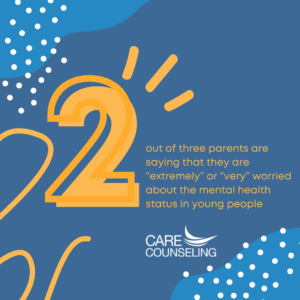 Two out of three parents are saying that they are “extremely” or “very” worried about the mental health status in young people, according to a Harris poll. The youth-mental-health-crisis is a concern for most Americans, especially parents who are seeing a worsening their children’s mental health since the pandemic.
Two out of three parents are saying that they are “extremely” or “very” worried about the mental health status in young people, according to a Harris poll. The youth-mental-health-crisis is a concern for most Americans, especially parents who are seeing a worsening their children’s mental health since the pandemic.
Seeking professional help for your child can be a big step but does NOT mean that you are a failure. There are many reasons why a parent or caregiver may be reluctant to seek help. To help destigmatize seeking professional help, I’d like to share some of the common experiences that parents and caregivers experience and strategies that I have found helpful to help overcome seeking mental health treatment as a parent.
Reason: Difficulty Asking for Help
Asking for help can be difficult as one is admitting that they cannot do something on their own and need help. You may have been taught to handle things on your own, “keep it in the family” or not ask for help. It may be scary to let go of some control, especially if you are already beginning to feel helpless. Pride can get in the way “I got this—I don’t need anyone”. You may have had a bad previous experience when asking for help or may struggle to trust others.
Pro Tip:
Asking for help gets easier the more you do it! Asking for help does not mean that you are a failure or that you are not competent. I view being able to ask for help as having an awareness of your own strengths and limitations and being an advocate to seek out what you need. If something is not working, it is OK to try something new.
Reason: Fear of Judgment
Fear of judgment is a big area of concern. “What will my friends and family think?” Parents and caregivers may also have some fear of how they will be viewed by a therapist or other professionals such as being blamed or feeling shamed. Parents may be already struggling with their own mental health and/ or substance use concerns and internalize negative beliefs about themselves.
Pro Tip:
Becoming more vulnerable as an act of courage, showing self-compassion, and examining one’s own beliefs and values can help reduce fears of judgement. Being willing to seek your own mental health treatment and engage in good self-care is recommended. I have found that many parents have similar struggles, but it took that first step to reach out.
Reason: Misinformation
Misinformation can create stigmas and lead to avoidance of seeking help. Negative stereotypes that you must be “crazy” to see a therapist is not true. There are various levels of support for mental health. Some parents fear “labels” related to diagnosis. This is often due to misinformation as some diagnoses such as adjustment disorders are very common and do not follow a child their entire lives (also misinformation) as these typically resolve after the child has adjusted and the source of stress has improved. There are effective treatments available, and a diagnosis helps identify the interventions that are most appropriate. Not addressing emerging mental health concerns can contribute to more severe and pervasive difficulties into adulthood.
Pro Tip:
Become empowered to learn more about children’s mental health, levels of support, and effective treatments. Intervene early and be willing to actively engage in family interventions. Familiarize yourself with local resources as well as national supports that may be helpful. In my experience, I have met some of the most well-informed, caring, and loving parents who actively seek out mental health supports as needed for themselves and their families.
We’re Here to help
Our wellness experts will be happy to take care of you. You can CLICK HERE to schedule an appointment now or call (612)223-8898.
Meet Clinicians
We’re united by our commitment to providing effective, relevant, and innovative mental health support at all stages of your journey. Click Here to find out more about who we are, where we come from, and how we live out CARE’s mission every day.
The professionals at CARE are actively collecting and creating resources to help with what you need. We’re Here for You.



